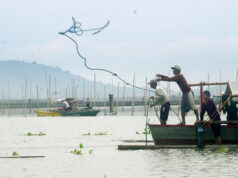Hog prices under pressure from panic-selling, changes in consumer preference
HOG RAISERS said prices for their produce are under pressure from small growers who were panicked into selling their herds at fire-sale prices following the outbreak of African Swine Fever (ASF) on Luzon.
Pork Producers Federation of the Philippines (ProPork) President Edwin G. Chen told BusinessWorld in a text message that the industry is also under pressure from consumer avoidance of pork due to the ASF outbreak, and urged the government to eradicate the disease quickly.
“The industry is having a hard time due to low farmgate prices,” he said, noting that farmers now fetch about P80 to P95 per kilogram (kg) for their hogs. This is much lower than the P110.15 per kg reported by the Philippine Statistics Authority for the second quarter of the year, prior to the outbreak of ASF.
“Let the industry and the government control and eradicate this animal health disease,” he said.
“Backyard and commercial farms also panicked and sold their herds at crazy low price. Many backyard and commercial farm owners are facing huge financial losses,” Mr. Chen added.
He said consumers have shifted to other types of meat amid misleading information about the dangers of consuming pork during an ASF outbreak.
“I think the consumers over-reacted to the ASF scare. They only harm their own pockets. They made the other meats more expensive,” Mr. Chen said.
“ASF is not a public health issue. ASF cannot attach to the human body. It will never cause harm to humans,” he said.
Chicken price has been increasing in recent weeks. According to the Department of Agriculture (DA), the average price of whole chicken on Oct. 18 was P173.54 per kg, up 1.7%, week-on-week.
“ASF is here to stay, [but] we will weather this and the industry will surely bounce back,” he said.
The DA’s latest count of culled pigs is 52,000, with about 17,000 infected by ASF and the remainder destroyed as a precaution. This total represents 0.41% of the 12.7 million Philippine hog population. It has yet to release an estimate on the economic impact of the disease.
About 22 areas are now confirmed to have been infected by the virus, including Rizal, Bulacan, Pampanga, Quezon City, Nueva Ecija, and Cavite.
The government has increased its financial assistance to backyard raisers whose pigs were culled to P5,000 per head from P3,000 previously. — Vincent Mariel P. Galang



